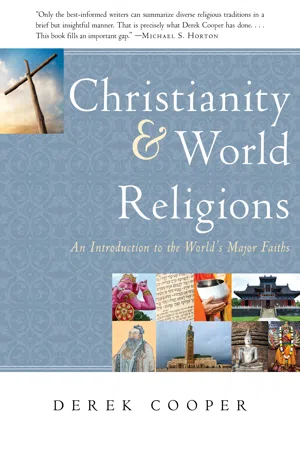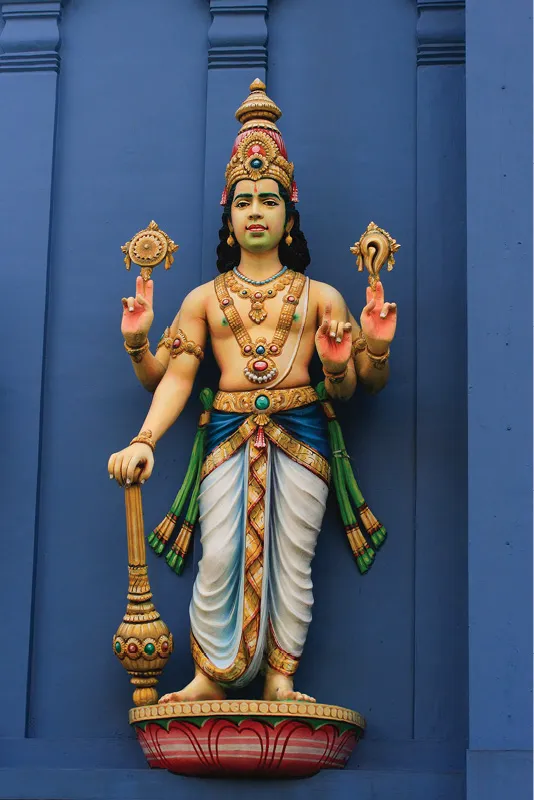
eBook - ePub
Christianity and World Religions
An Introduction to the World's Major Faiths
- English
- ePUB (mobile friendly)
- Available on iOS & Android
eBook - ePub
About this book
Due to the increasingly global culture in which we live, it is important for Christians to know something about the major world religions so that we can speak confidently about our faith—there is no place in our interactions for fear. On the contrary, by learning about other religions we are able to learn more about God and Christianity, and how we can be more faithful to Christ.
Frequently asked questions
Yes, you can cancel anytime from the Subscription tab in your account settings on the Perlego website. Your subscription will stay active until the end of your current billing period. Learn how to cancel your subscription.
No, books cannot be downloaded as external files, such as PDFs, for use outside of Perlego. However, you can download books within the Perlego app for offline reading on mobile or tablet. Learn more here.
Perlego offers two plans: Essential and Complete
- Essential is ideal for learners and professionals who enjoy exploring a wide range of subjects. Access the Essential Library with 800,000+ trusted titles and best-sellers across business, personal growth, and the humanities. Includes unlimited reading time and Standard Read Aloud voice.
- Complete: Perfect for advanced learners and researchers needing full, unrestricted access. Unlock 1.4M+ books across hundreds of subjects, including academic and specialized titles. The Complete Plan also includes advanced features like Premium Read Aloud and Research Assistant.
We are an online textbook subscription service, where you can get access to an entire online library for less than the price of a single book per month. With over 1 million books across 1000+ topics, we’ve got you covered! Learn more here.
Look out for the read-aloud symbol on your next book to see if you can listen to it. The read-aloud tool reads text aloud for you, highlighting the text as it is being read. You can pause it, speed it up and slow it down. Learn more here.
Yes! You can use the Perlego app on both iOS or Android devices to read anytime, anywhere — even offline. Perfect for commutes or when you’re on the go.
Please note we cannot support devices running on iOS 13 and Android 7 or earlier. Learn more about using the app.
Please note we cannot support devices running on iOS 13 and Android 7 or earlier. Learn more about using the app.
Yes, you can access Christianity and World Religions by Derek Cooper in PDF and/or ePUB format, as well as other popular books in Theologie & Religion & Vergleichende Religion. We have over one million books available in our catalogue for you to explore.
Information
Part 1
The Six Rival Stories of the World

The last several decades have witnessed a dramatic increase in the power of stories to structure and give meaning to life. Indeed, stories are important vehicles used to transmit ideas. One of the primary objectives of this book is to understand the rival stories of the world. As is probably assumed, there are many more competing stories than we have time to address in this book. But we will focus on what I believe are the six most influential religious stories that rival the Christian story.
The first part of this book will discuss the essentials of the six rival stories of the world in five chapters. Each chapter will contain six parts: (1) the beginning of the story, (2) the religion’s historical origin, (3) religious writings, (4) beliefs,1
(5) worship practices, and (6) a point of contact with the religion. Because this is an introductory book, we will focus on the main points of each of these religions. At the same time, I include many details about each religion that will give us an informed overview of the religious stories of the world.
(5) worship practices, and (6) a point of contact with the religion. Because this is an introductory book, we will focus on the main points of each of these religions. At the same time, I include many details about each religion that will give us an informed overview of the religious stories of the world.
Hinduism: The Story of Diversity and Devotion
Hinduism is by far the most complex religion in the world, shading under its enormous parasol an incredibly diverse array of contrasting beliefs, practices, and denominations.
Linda Johnsen
Hinduism is not organized in the way we see most religions in the world. It does not have a particular founder, savior, book, leader, or holy place. It has no specific day of the week to observe, or call to prayer, or certain ritual that everyone must observe. It is decentralized and localized in a way in which it allows anyone to observe the basic principles that are best for him or her.
Stephen Knapp
There can be as many Hindu Gods as there are devotees to suit the moods, feelings, emotions and social backgrounds of the devotees.
Sri Ramakrishna
Part 1: The Beginning
In a beginning, says Hinduism—not the beginning—the universe was full of water. In the middle of the water was an ever-growing egg, which was surrounded by the four elements of wind, fire, water, and sky. In the middle of the egg was Vishnu, one of the three most powerful gods in the Hindu pantheon. Vishnu was floating on the egg in the water and took the form of Brahma, the god of creation, who then created everything. When it is time to destroy this present world before creating the next, Vishnu will take the form of Shiva, the god of destruction. Together these gods—the Hindu trinity—create, sustain, and destroy the universe.2
In a beginning—so goes another Hindu creation story—the universe was but a soul or atman. Because it desired a mate, it became as big as a man and a woman who were embracing, and divided its body in two. Together they produced humankind. Afterward the soul of the woman became a cow, and the soul of the man became a bull. From their union cows were born. The soul of the cow proceeded to turn into every female animal species, just as the soul of the bull transformed itself into every male animal species until all animals, “down to ants,” were created. Eventually the original soul created everything else in the world in a similar way. At the conclusion of the creation account, it was discovered that the soul was actually Brahman—Pure Awareness or the Supreme Reality. This reinforces the idea that everything is either directly or indirectly connected to Brahman.3
In a beginning—so goes just one more Hindu creation story—there was nothing in the universe. In fact, the universe was not there either! The only thing that existed was the Brahman or Divine Essence, which was without beginning or end. Lord Vishnu manifested himself on the water, where he slept on a great egg. While he was asleep, a lotus flower appeared out of his navel, and it grew and grew. From that lotus flower emerged the god Brahma—not to be confused with Brahman, of which Brahma is just one manifestation.
Brahma was curious about the origin of this lotus flower, and began asking himself the basic questions of life: “Who am I and where have I originated? What is the purpose of my existence?”4 So he traveled for a hundred years to find the origin of the lotus flower; when he could not find it, he took another hundred years to return to his original home. Eventually he fell asleep from exhaustion. When he awoke, the four-armed Lord Vishnu was standing before him, and ordered him to perform meditation. Brahma did not realize that Vishnu was the origin of the lotus flower that bore him, so he was put off by this other being ordering him around! Immediately the two got into a fight and continued fighting until they saw the image of the god Shiva standing before them. They agreed to stop fighting so that they could locate the origin of the shadow. They searched for thousands of years, to no avail.

Fig. 1.1. Statue of the Hindu god Vishnu on a temple wall.
Similar to the case before, the two gods Vishnu and Brahma ceased searching and decided to pray. After a hundred years of praying, the five-faced and ten-armed Shiva appeared before them. It was good that they were all together, they agreed. Shiva made an important announcement:
We are all three parts of the same entity. We are one and the same though having different forms. Brahma is the creator, Vishnu is the preserver, [and] I am the destroyer . . . . There is another being named Rudra who will originate from my body. But understand that Rudra and I will not be different.5
Once each of their roles had been established, creation began. In this way, these three supreme Hindu gods created humankind and everything that exists.
So go three of the more interesting creation stories of Hinduism. There are many more creation stories—thousands more. If you are anything like me, you may be wondering how it’s possible to have multiple creation accounts. Isn’t there only one? In Hinduism there are two ways to answer this question. The first is that there are myriad accounts of creation. And none of these is perceived as “contradicting” another. Rather, each...
Table of contents
- Brief Contents
- Contents
- Acknowledgments
- Introduction
- Part 1: The Six Rival Stories of the World
- Part 2: Christian Responses to These Stories
- Conclusion
- Appendix A Projects, Essays, and Worldview Questions
- Appendix B Online Links to Religious Writings270
- Appendix C A Guide to Visiting Non-Christian Worship Spaces
- Glossary
- Credits
- Index of Subjects and Names